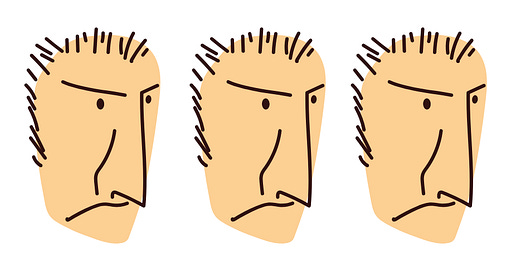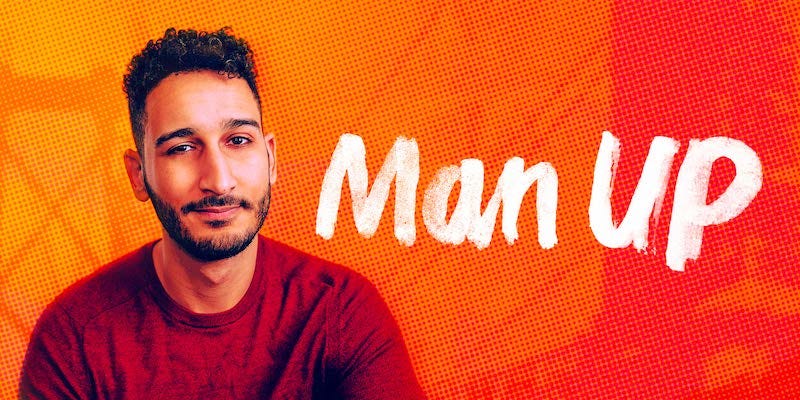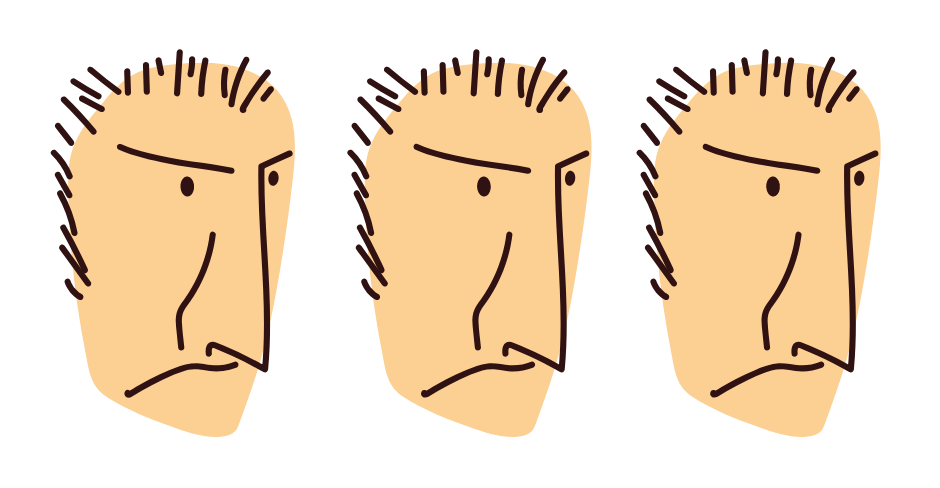Issue 06: Dad, what does it mean to be a good man?
On masculinity in immigrant communities
"A good man makes everyone happy. Works hard. He's ethical. He realizes there's more to the universe than this little world," my dad tells me.
That's...um...vague. But truth be told, it's exactly what I expected. Coming from me, a daughter known to criticize every little thing through her feminist lens as some form of misogyny, he probably (and rightfully) felt defensive just hearing the question.
The conversation could've ended there. It usually would. But I waited, gave him a little more time to think on it.
"I don't like to do anything without mom," he says, breaking a somewhat uncomfortable silence. Then he goes on and on. He wouldn't dare go see a movie without her, let alone book a trip. If she's stuck at home in the evening finishing up some office work, he'll do the laundry or air-fry some salmon for dinner just to keep her company, even if he wants to go to mosque himself. My mom would have no problem doing any of the above on her own, btw.
"But dad, what about your anger?" I interrupt, fully realizing he's in the middle of playing some hardcore defense.
"Look, I wasn't always angry," he tells me.
Dad grew up in Central India. Unlike many boys, he wasn't taught to suppress his emotions. He was actually quite expressive, participated in theatre and once dreamed of making it to Bollywood. He was known as the class clown. Then he grew up, got married and left India.
After moving to Saudi Arabia and eventually to the United States, a wave of depression took over. My parents, both doctors back home, turned to working night shifts at Dunkin' and selling phone cards to NYC convenience stores to get some grub for the kids on the table. As foreign graduates, they weren't able to practice again until at least a decade after moving to America.
I didn't notice dad's depression at first. But it was impossible to dodge the anger.
He and I have always been good at hurting each other, from all the times he labeled me selfish for wanting to put myself first to the night he told me no man will ever fully love me if I actually expect to be treated equally.
But all the word vomit came in the heat of the moment, in the midst of completely unrelated arguments, with blood boiling and sweat dripping and anger I've grown to accept as misdirected.
The more I read about learned masculinity, the more I understand and forgive my dad for the verbal pain. The last time he called me selfish, I had just revealed I'd been looking for apartments. This was about a year after college and I'd been living at home to save money while I worked at a local law firm. To my surprise, he uh...didn't take the news very well.
Dad told me my decision to leave home meant I wasn't just self-centered, but that I didn't care about my 8-year-old dog. Told me if I actually moved out, he'd take Scamper back to the shelter. (Lol what?!?!? After 8 years!? I bawled).
But that's when I realized where the anger was coming from. My dad was closer to Scamper than any of us—and still is. This wasn't about me being selfish and putting my needs and wants before my family dog. It was about his daughter moving out. About me leaving him behind. I was moving 20 minutes away.
That second incident—when he essentially told me not to expect equal treatment from a man? Rooted in guilt. I called him out for raising his voice at my mom, and he didn't like it. The next day, he apologized. But I have a bad habit of never really forgetting the sting.
My dad no longer takes medication for depression, and he never really opened up to the idea of talk therapy. Mom says he's not really depressed anymore; that it was all situational; that treatment isn't necessary at this point. He's jolly more than angry now. And he apologizes—often. But in my opinion: Therapy is always beneficial and usually necessary.
When I was reading the research on how masculinity manifests itself in migrant men and their mental health, I found significant parallels with my dad's experiences.
For one, whether my dad wants to admit it or not, there are still plenty of cultural gender norms he struggles with. It frustrates him when my mom vocalizes her independence. He loves her dearly, but I think in some loving yet twisted way, he needs her to need him more.
When my dad was most depressed, his primary issue was failing at being the so-called breadwinner, as cultural norms would have it. Anger, of course, is another major parallel. Research consistently shows men with masculinity-related depression turn to rage. While my dad, one of the kindest souls on the planet, never turned to violence himself, the global stats on traditional masculinity and violence against women can't be overlooked.
What's so toxic about masculinity?
How toxic masculinity hurts everyone
Toxic masculinity typically refers to actions that discourage emotional responses in men (apart from anger) and, at the same time, encourage "dominant" behaviors. Think: Boys don't cry! Man up! Don't cry like a girl.
In boyhood, dismissing feelings of pain can teach children to avoid expressing themselves as they really are. And over time, those feelings can manifest into a mental illness, most often depression, PTSD, body dysmorphia or anxiety. Young boys then grow up burying their emotions even as men.
In adulthood, men typically deal with their depression by over-working or self-medicating through drugs and alcohol (Psychoanalytic Psychology).
Then there's the anger. Men with internal conflicts tend to direct their frustrations at those around them, including partners and children. In fact, research by the World Health Organization shows men and boys who adhere to rigid, traditional notions of gender roles and masculinity are more likely to report having used violence against a partner. More on that at acalltomen.org.
Toxic masculinity and the LGBTQ community
One of the consequences of toxic masculinity ideology involves fostering homophobia (Kupers 2005).
"For a lot of gay men, just by being gay, there is this sense of insecurity of being a failure because they're not performing their masculinity in the way that they (feel like they) are expected to," Adam Davies, who studies education, gender and sexuality at the University of Toronto, told HuffPost last year.
"There is a constant dissonance between what they are trying to achieve versus what they actually want, which slowly has an effect on one's mental health, sexologist Alex McKenzie added. "It erodes your well-being the more it goes on."
Individuals who identify as transgender often see both sides of sexism.
Toxic masculinity and immigrants
There still isn't much research on how immigrant men and women navigate dominating forms of masculinity in their destination countries. Generally, "one of the reasons masculinity's 'toxic' effects aren't well known might be that few men seek treatment from psychologists — making them harder to study," says research psychologist Michael Addis. Immigrant men are even more hesitant than natives to rely on professional help.
But here's what I've found on my research spree:
Finding and keeping a job = one of the top factors in male disempowerment among migrants in a system that favors advanced skills and/or cheap labor
It's common for migrant men to come from cultures where they're expected to be the breadwinner and provider. Adjusting to a dual-income household (or one in which a partner brings home the bacon) can be mentally challenging in cultures adhering to rigid gender roles.
The breadwinner challenge is especially problematic in African men who also face uneven race and class discrimination. (Wa Mungai, Ndungi and Pease, Bob; 2009)
Asian cultural masculinity also relies heavily on scholarship and not showing weakness, something rooted in history: "everything from the treatment of Chinese immigrant laborers in the nineteenth century to representation in contemporary media." (Catapult)
Chinese women in some cases are expected to prioritize domestic workloads over their own careers, especially during family settlement, leading to downward mobility of women migrants. (Ho 2006)
Gender socialization in South Asian cultures continues to prescribe qualities of strength, toughness and aggression to men. Women, on the other hand, are presumed to be weak, nurturing and submissive. Toxic masculinity in India in particular is a significant problem, especially when it comes to violence against women. Bollywood films, at least historically, haven't helped. (Dutta and Ganguly, 2019)
Do you have a piece of research you'd like me to highlight? Send me an email!
For all who identify as men: The Good Men Project is apparently having "the conversation no one else is having." In this specific piece, a Dr. Joe Kort discusses the assumed requirements of patriarchy, misandry, and microaggressions. The Book of Man offers various things men can do to end toxic masculinity plus an ENTIRE section on mental health!
For my LGBTQIA friends struggling with masculinity issues, turn to: ItGetsBetter or the Trevor Project, both highly recommended by the National Alliance on Mental Illness. If you're thinking about counseling, the Association of Gay and Lesbian Psychiatrists offers a directory of LGBT-friendly therapists.
For parents: In this NYT piece, authors Caroline Crosson Gilpin and Natalie Proulx suggest ways to deconstruct definitions of masculinity as they manifest in our society and our lives. If you're a book reader, check out "How To Raise A Boy: The Power of Connection to Build Good Men" by psychologist Michael C. Reichert.
For mental health professionals: The American Psychological Association recently unveiled its guidelines on psychological practice for men and boys. From APA: "Thirteen years in the making, they draw on more than 40 years of research showing that traditional masculinity is psychologically harmful and that socializing boys to suppress their emotions causes damage that echoes both inwardly and outwardly."
For domestic violence victims: Know the signs of abuse. Save the National Domestic Violence Hotline number, 1-800-799-7233. You can also chat with an advocate on the official site. Read survivor stories.
If you know a victim of domestic violence, refer to this Domestic Shelters toolkit.
Meet Aymann Ismail, host of Slate's "Man Up" pod!
(Photo: Lisa Larson-Walker)
As a boy growing up in Newark, New Jersey, Aymann Ismail quickly picked up on the gender cues his immigrant parents had themselves inherited back in Egypt. Men were meant to be unemotional, but resilient. They were to marry a wife from their own Muslim community and have dutiful kids who'd grow up to do the same.
"I didn’t much question who I was meant to be," Aymann wrote earlier this month in an introduction for his new kickass Slate podcast "Man Up," dedicated to unraveling our experiences in this hyper-masculine world.
"I took it for granted, shut down my doubts in my teen years, and took on an air of tough indifference. If I acted like that man, then I would be that man."
When he got married, Aymann realized he didn't really know what his wife needed from him, nor did he understand what he wanted from himself.
Did I ever have a say in what was normal? How'd we get here? Why do men fight before we talk? How can we change? Those are some of the questions he digs into on the new pod.
Available on iOS, Stitcher, other podcast players and on Slate.com.
This excellent 2017 essay at Bad Hombres features 12 Latino men on the dangers of toxic machismo—and how to stop it. "All of us, no matter how enlightened we think we are, have blind spots with respect to others’ life experiences and struggles," says Salvador Pérez. "As men, the best of us can and occasionally do fail to overcome unconscious sexist biases." Read here.
Siddharth Dube, a New Delhi journalist, writes about how he came to learn "homophobia was as much a part of Indian culture as it was of American or British culture." Dube, who came out in adulthood, recalls the taunting in childhood of his pretty-boy looks and feminine nature. Read here.
In this first-person piece for Voice Male Magazine, Indian UK student Shannon Philip writes about how he was taught to be a certain type of boy: messy, stoic, sports-loving. He connects his own experiences to the country's overarching history of masculinity norms following the horrific gang rape of Jyoti Singh in 2012. Read here.
"I honestly don’t know whether my father would describe his sentiments for me as love or not," Chinese American Mimi Wong writes for Catapult. An excellent first-person account on what felt like conditional fatherly love through the lens of an "Americanized cultural perspective." Read here.
The Chicago Tribune's Joanne Yj Km interviewed first-gen immigrant Asian Americans about their dads ahead of Father's Day in 2016. Perry Li, a second-gen Chinese-American born in Chicago, said he resented his father most of his life until recently because he rarely showed him affection. But he wants to be more understanding of the struggles his father endured. Read here.
Rohini Nilekani highlights an urgent need to turn to Indian boys and men "with as much urgency and focus as we spend on the millions of young women and their multiple needs" in her essay for Quartz titled "Boys can't be boys. Here's how to fix India's toxic masculinity problem." Read here.
Interested in helping fact-check this newsletter? I could use the help! Send me a note: fiza.pirani@gmail.com.
Foreign Bodies is a monthly e-mail newsletter dedicated to the unique experiences of immigrants and refugees as they relate to coping with mental illness and wellness. It’s written and curated by Atlanta-based writer Fiza Pirani with copyediting and fact-checking help from New Jersey-based independent journalist Hanaa’ Tameez. Want to contribute your time or share your own #ForeignBodies story? Send an email to 4nbodies@gmail.com or say hi on Twitter @4nbodies. Special shout-out to Carter Fellow and friend Rory Linnane for the adorable animated logo!









